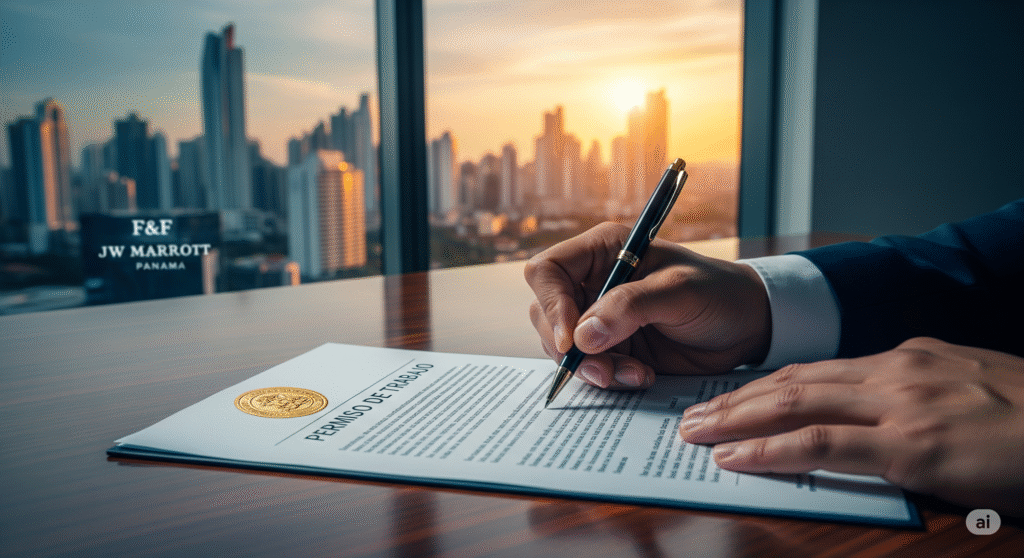
Introduction – Why Work Permits Matter in Panama
Panama’s growing economy and strategic location make it an attractive place for expats seeking professional opportunities. However, the country has strict labor laws designed to protect local workers. This means that foreign nationals need an approved work permit to legally work in Panama.
To legally work in Panama, foreigners need residency + a work permit. Residency is handled by the National Immigration Service, while the work permit is issued by MITRADEL (Ministry of Labor). These are separate processes, and you generally establish residence before applying for the permit.
For many expats, understanding how the system works is the first step toward a successful relocation. This guide explains the different types of work permits, requirements, costs, and common challenges—plus first-hand insights from expats who have gone through the process.
Types of Work Permits in Panama
Panama offers several categories of work permits for foreign nationals:
- Friendly Nations Visa–Linked Work Permit – For citizens of countries with special agreements with Panama, often combined with permanent residency status.
- Special Professional Permits – For foreign professionals in high-demand fields such as engineering, IT, or finance.
- Temporary Work Permits – For short-term contracts or specific projects.
- Special Economic Zone Permits – For those working in zones like Panama Pacifico or the Colon Free Zone, which have their labor regulations.
The Company Quota Rules (10% & 15%)
Panama limits how many foreign workers a company can employ. In broad terms:
- 10% quota: ordinary personnel (administrative/operational).
- 15% quota: trusted personnel and technicians/specialists (managerial, supervisory, or technical roles).
- Special regimes (e.g., free zones) may have tailored rules. Always check how your role is classified and whether your employer’s headcount/salary mix fits within the quota.
Practical note: In some reforms, authorities clarified who counts toward the quota and confirmed you must have a local employment contract and be on local Social Security payroll. Your employer’s HR and counsel should plan this early.
Common permit pathways you’ll see in practice:
- Quota-based permits (10% ordinary / 15% trusted or technical).
- Friendly Nations Visa–linked work authorization (separate from residency; still processed by MITRADEL).
- Panama Friendly Nations Visa
- Special Economic Zones (e.g., Panama Pacífico, Colón Free Zone) with tailored labor/immigration frameworks.
- City of Knowledge Work Program (Fort Clayton): a limited number of special permits for investors/employees in that hub.
Special Regimes & Edge Cases to Know
- City of Knowledge: up to five special work permits for qualifying entities (research, tech, education). Tenure can reach up to six years in certain cases.
- Married to a Panamanian: different basis for work authorization may apply; still expect formalities.
Requirements for a Work Permit
Applying for a work permit requires both personal and employer-provided documentation:
- Valid residency status or eligibility under a specific visa category.
- A signed employment contract with a Panamanian company.
- Apostilled copies of your university degree or professional certification.
- Criminal background check from your country of origin.
- Company documents proving compliance with Panamanian labor laws.
Processing Times (By City) & Validity
Realistic expectations for timing matter:
- Panama City filings: commonly ~6–7 months to resolution.
- David Chiriqui filings: commonly ~9–10 months; once approved, add 2–3 months for the physical work-permit ID issuance.
- Typical validity is 1–2 years, renewable depending on category.
First-Hand Insight: Why a Job Offer Comes First
A long-term U.S. resident in Panama summed it up this way:
- Golden rule: secure a firm job offer/sponsor first; Panama protects local jobs, and applying without a sponsor is an uphill battle.
- The process is paperwork-heavy and slow; gather apostilled documents before arriving. Hire a local immigration lawyer – They know the legal nuances and can save you time and stress.
- Costs add up; employers often cover fees, but confirm in writing.
- If sponsorship isn’t realistic, consider remote work or entrepreneurship instead of chasing a local payroll role immediately.
Application Process
The work permit application must be submitted through a licensed Panamanian attorney. The general steps include:
- Collecting all required documents (passport, photos, apostilled certificates).
- Providing an employment contract from the sponsoring company.
- Applying to the Ministry of Labor.
- Waiting for approval, which can take several months to a year.
This expat noted that the process is slow and paperwork-heavy, and patience is essential. Panama’s bureaucracy operates at its own pace, so planning is key.
Costs and Who Pays Them
Government fees for work permits are typically around $500 for foreigners, though certain nationalities may pay less under specific agreements. Legal fees vary depending on the attorney and the complexity of the case.
- Depending on the category, government fees can range roughly US$100 – US$600; firms quote different all-in estimates. Expect additional professional service fees.
Many employers cover these costs for the employee, but if you are paying out of pocket, be prepared for a significant expense. The expat’s experience confirmed that companies willing to sponsor the permit often also handle the financial side.
Challenges and Common Mistakes
- Applying without a qualifying job offer.
- Submitting incomplete or non-apostilled documents.
- Not hiring an immigration lawyer to navigate the process.
Step-by-Step (How to Apply, Practically)
- Confirm your eligibility category (10%, 15%, special regime, or visa-linked).
- Secure a local employer sponsor and contract that fits the quota.
- Prepare apostilled documents (degree, background check), plus employer corporate docs.
- File through a licensed Panamanian attorney with MITRADEL.
- Track processing (expect months), receive resolution, then your work‑permit ID. Timelines vary by city.
Final Thoughts
The same expat concluded: “If you have a good sponsoring company, the process is manageable. If not, remote work or entrepreneurship may be better options.”
Disclaimer: This article is for informational purposes only and does not constitute legal advice. Always consult a qualified immigration lawyer before applying for a work permit in Panama.
5 FAQ (Quick Answers)
1. Do I need residency before the work permit?
Generally, yes—residency and work permits are separate; you typically establish residence first, then apply at MITRADEL.
2. How many foreigners can my employer hire?
Typically 10% of total staff (ordinary roles) and up to 15% for trusted/technical roles—subject to salary and headcount limits and any special-regime rules.
3. How long does it take?
Commonly 6–7 months in Panama City and 9–10 months in David, with an extra 2–3 months in David to get the physical ID.
4. How much does it cost?
Plan for ~US$500 government fee in many categories plus legal/professional fees; ranges vary by case.
5. Are there exceptions or special permits?
Yes—Friendly Nations–linked authorizations, special economic zones, and City of Knowledge permits each have specific rules.
